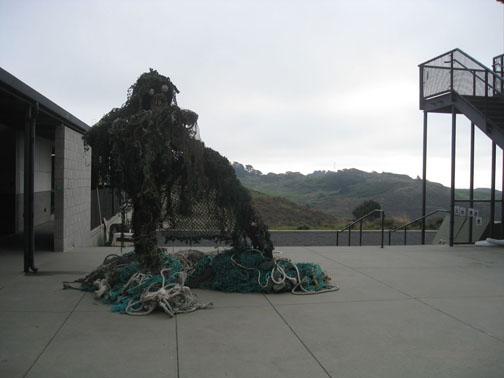It was such an auspicious beginning — the ghost net monster animated by
the wind whipping the nets was better than we could have imagined.Then watching visitors to The Marine Mammal Center do the attraction/repulsion dance as
they were intrigued and then horrified — and yes, that undeniable smell of
whale.
In our early years, after our grad school training in
post-modern art theory it was the esoteric and difficult that seemed important.
Since we began our beach plastic project we have turned the tide and have
sought venues where art could have a wider impact. Our work has gone well
outside the confines of the traditional gallery/museum, white-walls spaces.
We've been heartened to see our work on the back of busses, at the US Embassy
in Tbilisi, at the San Francisco Public Library, in the bathrooms of an upscale
resort hotel. The world outside the accustomed is where we want to be. We love
visiting the ivory towers of culture, but to see our work at the TMMC feels
totally right, and we happy to be a part of the TMMC's mission to include art
as part of the program.
Why art in a
hospital? TMMC is a special place for healing, not only for the marine mammals
who are patients but also for the visitors, volunteers, and staff.
We believe that if art that can hold the gaze of the viewer
long enough to interrupt the mind-numbing drone heard daily regarding the dire
state of the planet, it can have a positive healing and life-affirming effect.
Hey, we too are marine mammals and we are glad to have that
special TMMC healing energy coming our way.
Thanks to Michael Hanrahan for his comprehensive report
about “The Ghost Below” for the Mill Valley Patch.
That’s Alex Treu, fabricator, Judith Lang, artist, Richard
Lang, artist and Anne Veh, curator in the photograph.


